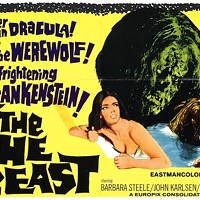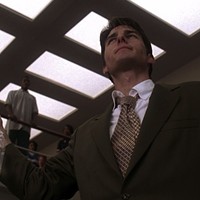(View From The Couch is a weekly column that reviews what's new on Blu-ray and DVD. Ratings are on a four-star scale.)
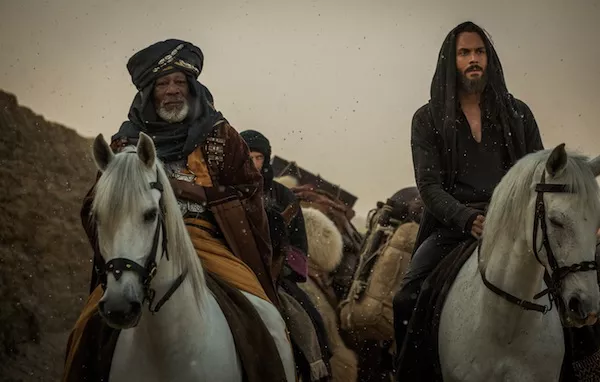
- Morgan Freeman and Jack Huston in Ben-Hur (Photo: Paramount & MGM)
BEN-HUR (2016). This latest adaptation of Lew Wallace's 1880 novel Ben-Hur: A Tale of the Christ is by no means a terrible picture, but it's a terribly mismanaged one, operating in fits and starts under the auspices of director Timur Bekmambetov. Bekmambetov's last stateside assignment was Abraham Lincoln: Vampire Hunter, and perhaps adding some bloodsucking vampires to wreak havoc alongside the bloodsucking Romans might have been the way to go. As it stands, there's not much here that's particularly noteworthy, with the best scenes crammed into the first stretch that illustrates how two mutually adoring brothers, the Jewish Judah Ben-Hur (Jack Huston) and the (adopted) Roman Messala Severus (Toby Kebbell), are eventually transformed into sworn enemies. Huston and Kebbell are acceptable in the central roles, and their performances might have carried even more weight had this project debuted on the small screen, where it would have been accorded a more comfortable fit. What's most shocking about Ben-Hur is how thoroughly it bungles the two most iconic and riveting sequences from the 1959 classic: Judah's torturous stint as a galley slave aboard a Roman ship and, of course, the chariot race between Judah and Messala. In both cases, the decision to film in extreme close-up was ill-advised, and these murky and incoherent bits are further crippled by obvious CGI (one galley shot hints that Bekmambetov wanted to make Hardcore Hur) as well as rapid-fire editing that recalls those Ginsu blades in action on late-night infomercials.
Blu-ray extras include deleted and extended scenes; a piece on the film's cast; and a look at the creation of the chariot race sequence.
Movie: **
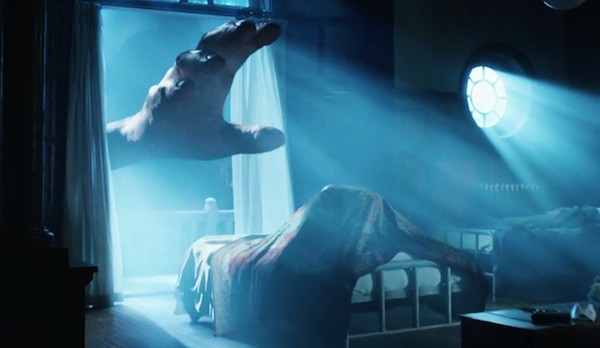
- The BFG (Photo: Disney)
THE BFG (2016). An adaptation of the beloved book by Roald Dahl, The BFG reminded me of the scene in (of all things) History of the World: Part I in which a bored Emperor Nero (Dom DeLuise) is presented with a wooden bathtub and mutters, "Nice. Nice. Not thrilling, but nice." That, in a nutshell, is the same reaction that occurs when presented with this Steven Spielberg underachiever. Spielberg's presence immediately rekindles memories of that childhood masterpiece E.T. The Extra-Terrestrial, but this is a far cry from that enduring piece of celluloid magic, despite both being penned by the late Melissa Mathison. Unlike that 1982 blockbuster, The BFG isn't emotionally gripping or excitingly staged. It's just ... nice. Say this for motion capture, though: It's come a long way, baby. Yet while its application to human faces and expressions is vastly improved — compare the big friendly giant voiced by Mark Rylance here to the boring, stiff conductor voiced by Tom Hanks in 2004's The Polar Express — it still isn't always up to speed in other regards: Character movement and object definition often look graceless, and, unless Andy Serkis is somehow involved, the procedure still suffers from a distancing effect that's long been conquered by just about every other form of animation. Still, the limitations of motion capture are only part of the problem. More detrimental is the fact that the movie exhibits little of the subversive bite of other Dahl adaptations like Willy Wonka & the Chocolate Factory and Matilda, and it exhibits even less of the excitement and sense of adventure we've come to expect from Spielberg when he's in a playful (rather than Oscar-courting) mood.
Blu-ray extras include a making-of featurette; a piece on the nonsensical language employed in the story; and a tribute to Mathison.
Movie: **

- Olivia Hussey in Black Christmas (Photo: Shout! Factory)
BLACK CHRISTMAS (1974) / DREAMSCAPE (1984). The Canadian effort Black Christmas is one of the best in the endless cycle of slasher flicks, largely because it arrived before the genre got set in its tired and overly familiar parameters. The nice virgin who survives in every post-Halloween picture? Forget it — here, she's the first one to go, murdered in her sorority-house room while the others celebrate the season downstairs. As other deaths follow, the detective (John Saxon) on the case suspects that the killer might be the twitchy boyfriend (Keir Dullea) of one of the sorority sisters (Olivia Hussey). The cops are among the dumbest ever committed to celluloid — they make any member of Mack Sennett's Keystone contingent seem as brilliant as Sherlock Holmes by comparison — but beyond that nagging annoyance, Black Christmas is a well-constructed thriller full of nifty set-pieces. Margot Kidder is terrific as a boozy, foul-mouthed sorority sister — it's a shame she's not in the picture more.

- Max von Sydow and Dennis Quaid in Dreamscape (Photo: Shout! Factory)
As for Dreamscape, it's a typically exuberant fantasy flick from the '80s, with Dennis Quaid cast as a man who can literally enter other people's dreams through the efforts of a scientist (Max von Sydow) and his assistant (Kate Capshaw). Eventually, he's asked to aid the U.S. President (Eddie Albert), who's suffering from nightmares portending a nuclear holocaust. The visual effects run hot-and-cold and the climax isn't as imaginative as one would hope, but Dreamscape nevertheless works as a diverting slice of sci-fi.
Blu-ray extras on Black Christmas include audio commentary by director Bob Clark; separate audio commentary by Saxon and Dullea; a making-of retrospective; interviews with Hussey and Kidder; a Q&A session with Clark, Saxon and composer Carl Zittrer; and the theatrical trailer. Blu-ray extras on Dreamscape include audio commentary by producer Bruce Cohn Curtis, writer David Loughery and makeup and special effects artist Craig Reardon; a making-of retrospective; a still gallery; and the theatrical trailer.
Both Movies: ***
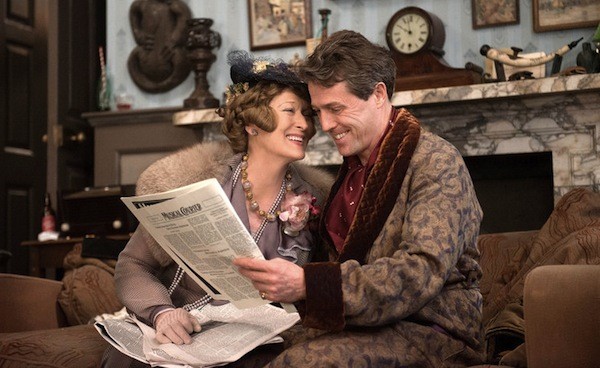
- Meryl Streep and Hugh Grant in Florence Foster Jenkins (Photo: Paramount)
FLORENCE FOSTER JENKINS (2016). There's no denying that Meryl Streep is one of the greatest actresses of our (all?) time, but there's plenty of room to argue that her recent run hasn't been as astounding as past laps of victory. Despite the knee-jerk awards attention for the likes of Into the Woods and The Iron Lady (and the less said about her slumming in the YA adaptation The Giver, the better), she hasn't hit a homer since her superb turn in 2009's Julie & Julia. With Florence Foster Jenkins, she returns in grand fashion, delivering a performance that's alternately amusing, brave and, above all, poignant. Yet she's not the only one who excels in this based-on-fact yarn about the titular New York socialite, a woman who loved to sing even though her voice was about as pleasing as that of a cat who just had a brick dropped on its tail. As St. Clair Bayfield, Florence's husband and the person who took it upon himself to guarantee that only friends and easy touches were allowed to hear her sing (professional critics were banned from her shows), Hugh Grant is equally marvelous. Meanwhile, The Big Bang Theory's Simon Helberg delivers a scene-stealing turn as Cosme McMoon, the talented pianist fearful that his collaborations with Florence might doom his burgeoning career. Like Tim Burton's Ed Wood, Florence Foster Jenkins offers a sympathetic portrayal of an individual whose creative and artistic zeal unfortunately outpaced any true talent. Then again, perhaps it was simply a matter of being born in the wrong era — after all, had she been a product of the 21st century, there's no doubt she would have enjoyed a healthy run on the idiotic American Idol.
Blu-ray extras include a behind-the-scenes featurette; deleted scenes; a Q&A with Streep; and a piece on the music.
Movie: ***
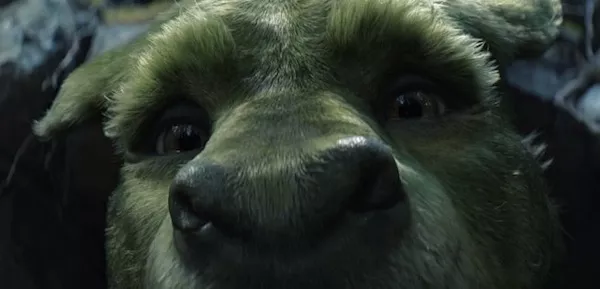
- Pete’s Dragon (Photo: Disney)
PETE'S DRAGON (2016). This family feature hearkens back to not one but two previous eras of cinematic wonder. The first, more obvious one is the late 1960s through the 70s, when the Walt Disney studio produced a series of winsome live-action pictures (Gus, Candleshoe, The Love Bug) even as its celebrated animation division hit upon hard times. The second is the mid-1990s, when studios (mainly Warner Bros.) weren't afraid to release comparatively quiet and contemplative films for younger viewers (The Secret Garden, A Little Princess, Black Beauty). Pete's Dragon feels like a throwback to both eras, and the fact that there was a version of this story produced in 1977 makes the connection even more tangible. This remake of that clumsy live-action/animated hybrid is clearly an improvement, fashioning a sweet story about a young orphan boy (Oakes Fegley) who spends years in the woods with a big, friendly, giant dragon as his only companion. Once civilization comes calling, Pete finds friendship in the form of a forest ranger (Bryce Dallas Howard) while his fire-breathing companion finds danger in the form of a lumberjack (Karl Urban) who, in true King Kong fashion, plans to capture and profit from the creature. Pete's Dragon is the second movie in this week's column to focus on a child's special relationship with an oversized creature, and it's accomplished enough to make The BFG look even less of a BFD than it already did. The gentle nature and leisurely pace might cause a few Coked out kids to fidget, but most should react positively to the picture's sense of adventure and discovery while parents will be pleased to have found a family film that, for once, does the much abused genre proud.
Blu-ray extras include audio commentary by director David Lowery, co-writer Toby Halbrooks, Fegley and co-star Oona Laurence; deleted scenes; and a piece on designing the dragon.
Movie: ***
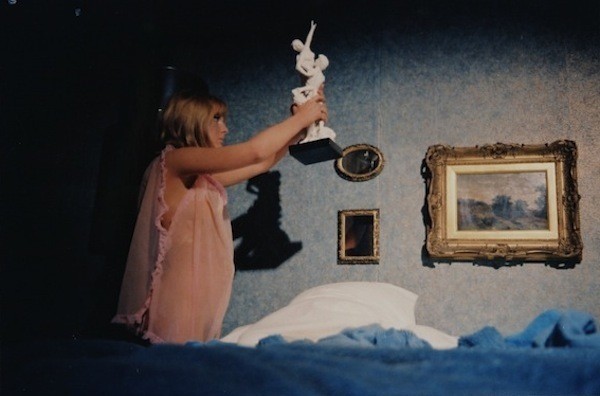
- The Stewardesses (Photo: Jezebel & Kino)
THE STEWARDESSES (1969). Back in 1969 and throughout the early '70s, The Stewardesses became a smash hit not only because it was a softcore sex flick but because it was a softcore sex flick in 3-D. During a period in which cinematic standards had been loosened and hardcore porn was just around the corner (Deep Throat and Behind the Green Door, both 1972), the makers of this film found an ingenious hook by reviving the 3-D craze of the 1950s and employing it in the service of a skin flick. The Stewardesses was an instant success, and in order to add a "message" and thus lessen the chances of its makers being hauled into court at some point for debasing moral standards (as happened with Deep Throat), additional scenes involving a semblance of a storyline were filmed and added during its run. The main story, however, is wafer-thin: A group of shapely flight attendants spend their downtime getting drunk, getting high and (especially) getting laid. The Stewardesses is largely worthless as a movie but utterly absorbing as a relic of its time, with many scenes more risible than titillating (e.g. a woman has sex — sort of — with a lamp). As for the three-dimensional aspect of the project (the characters themselves remain woefully two-dimensional), the two-disc set includes both the 3-D and 2-D versions of the movie (3-D requires a compatible TV and Blu-ray player).
Blu-ray extras consist of the 1977 softcore 3-D short Experiments in Love, and the theatrical trailer for The Stewardesses.
Movie: **
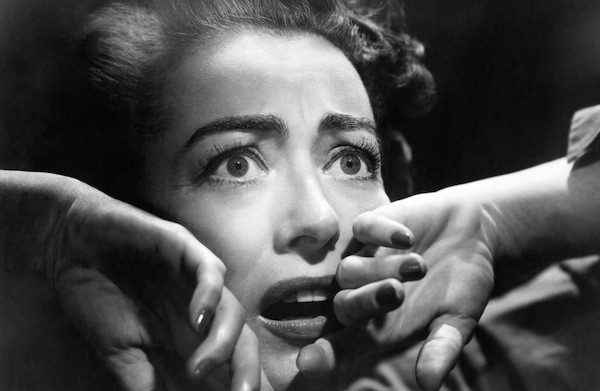
- Joan Crawford in Sudden Fear (Photo: Cohen)
SUDDEN FEAR (1952). Joan Crawford nabs one of her best roles in this sharp thriller in which she stars as Myra Hudson, a successful playwright who uses her authority to get actor Lester Blaine (Jack Palance) fired from her play during rehearsals because she doesn't think he possesses the right qualities for a romantic lead. They bump into each other later, all seems to be forgiven, and they fall in love and get married. What Myra doesn't know is that Lester, with the help of his slinky girlfriend Irene (Gloria Grahame), is planning to murder her for her money. Director of photography Charles Lang was already an expert at maximizing tension through his use of light and shadows (The Uninvited, Ace in the Hole), and he delivers similarly inspired results here. As for the performances, Crawford is excellent as the frightened woman who must keep her wits about her as she devises a scheme to save her own life, with Palance suitably menacing in one of his signature heel roles. Grahame won the year's Best Supporting Actress Oscar for her turn in The Bad and the Beautiful and she's excellent here as well; for its part, Sudden Fear earned nominations for Best Actress (Crawford), Best Supporting Actor (Palance), Best Black-and-White Cinematography, and Best Black-and-White Costume Design.
Blu-ray extras consist of audio commentary by film historian Jeremy Arnold, and the re-release trailer.
Movie: ***

- Margot Robbie in Suicide Squad (Photo: Warner & DC)
SUICIDE SQUAD (2016). Heavily hyped and heavily hopeless, Suicide Squad does the DC brand absolutely no favors. Keep in mind that I didn't hate Batman v Superman: Dawn of Justice, which was treated by most critics as the celluloid equivalent of End of Days but which earned a mixed review from me. But there's no doubt that with Suicide Squad, Batman v Superman and the wretched Man of Steel, DC is futilely trying to play catch-up with Marvel, which spent many years and multiple movies building up its brand. But if the Marvel Cinematic Universe is like a savory pot roast that's been allowed to marinate for hours, then the DC version is like a pack of instant mashed potatoes: Just add water and attempt to enjoy the lumpy result. The film's greatest failing might be its roster of misfits. They're intriguingly billed as the "worst of the worst," but most end up being sweethearts and, worse, most are one-note dullards. Will Smith adds some personality to Deadshot — ditto Jay Hernandez with Diablo and, occasionally, Margot Robbie with Harley Quinn — but Jai Courtney (Boomerang) is simply annoying, Joel Kinnaman (Rick Flag) is a human vacuum, and Cara Delevingne has the ancient Enchantress strutting around like a 21st century super-model (no shock, since the actress is a super-model). And then there's The Joker, played by Jared Leto in what was touted by the p.r. machine as a Method-style performance. There might indeed be Method to his madness, but it's of little consequence, since his interpretation of the part turns out to be even less frightening than Cesar Romero's portrayal on the campy '60s TV show.
The Blu-ray contains both the theatrical version and an extended cut that runs 11 minutes longer. Extras include a pair of featurettes on the team in both comic and movie form; a piece on The Joker and Harley Quinn; a look at the fight sequences; and a gag reel.
Movie: *1/2

- William Shatner in the “Nick of Time” episode of The Twilight Zone (Photo: Paramount & CBS)
THE TWILIGHT ZONE: THE COMPLETE SERIES (1959-1964). This classic and perpetually popular TV series has been available on Blu-ray for years in both complete box sets and single-season editions, but the good folks at Paramount and CBS have opted to re-release the entire show in a special 24-disc collection that's being offered at a lower cost than before (the list price is $126.99, but it can be found online for around $80-$85). Thus, fans can acquire all 156 episodes from the five-season series for just over 55 cents a show, an incredible bargain if ever there was one. As for the series itself, it needs little introduction: Rod Serling's brainchild is one of the defining programs in television history, employing the anthology format to relate offbeat tales often further distinguished by a twist ending. The number of instantly recognizable episodes (among them "Nightmare at 20,000 Feet," "Eye of the Beholder," "The Invaders," "Time Enough at Last," and the only episode that was a pick-up and not created specifically for the series, "An Occurrence at Owl Creek Bridge") is on the high side, while the guest list reads like a who's-who of future stars: Charles Bronson, Carol Burnett, James Coburn, Robert Duvall, Peter Falk, Lee Marvin (whose episode "Steel" later served as the inspiration for the 2011 Hugh Jackman film Real Steel), Robert Redford, Burt Reynolds, the Star Trek gang of William Shatner, Leonard Nimoy, George Takei and James Doohan, and many, many more. Interestingly, the show was hardly a ratings bonanza during its original run — it never once cracked the Nielsen Top 25 during its five seasons — and while it failed to ever be nominated in the Outstanding Drama category, it did win Serling a pair of consecutive Emmy Awards for Outstanding Writing (Drama).
Blu-ray extras include audio commentaries by cast and crew; the original pilot version; isolated music scores; and promos.
Series: ****

